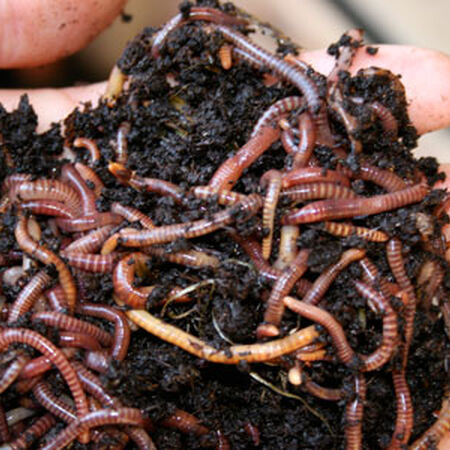
In the quest for sustainability and the fight against climate change, scientists and environmentalists often focus on high-tech solutions and ambitious policy changes. However, the unsung heroes in this battle are much smaller, humbler, and go about their work quietly beneath our feet: the red wiggler worms, scientifically known as Eisenia fetida. These remarkable little creatures have a profound impact on reducing our carbon footprint, and in this article, we’ll delve into their world, exploring how they work their magic and contribute to a greener, more sustainable planet.
Red wiggler worms are a type of earthworm characterized by their reddish-brown color, slender build, and remarkable ability to consume organic matter. These small invertebrates play a crucial role in ecosystems, particularly when it comes to decomposing organic material and promoting soil health. However, their significance reaches far beyond the earth beneath our feet.
Reducing our carbon footprint, essentially our impact on the environment through carbon emissions, is essential for mitigating climate change. Red wiggler worms are nature’s champions in this regard, and here’s how they contribute to this vital mission.
Decomposition and Carbon Storage: Red wiggler worms are voracious decomposers. They consume decaying plant material and transform it into nutrient-rich worm castings. In doing so, they not only recycle nutrients back into the soil but also reduce the release of carbon dioxide into the atmosphere. Their ability to process organic matter is astonishingly efficient, locking away carbon underground where it can’t contribute to greenhouse gas emissions.
Enhanced Soil Health: The benefits of red wiggler worms extend to the soil itself. Their constant burrowing and feeding activities help create channels within the soil, improving aeration and water penetration. This enhanced soil structure allows for better water retention, root growth, and an increased capacity for carbon storage. In other words, red wiggler worms are like natural architects, designing a carbon-friendly soil structure.
Beyond their role in soil health and carbon storage, red wiggler worms have also made significant strides in waste reduction. Vermicomposting, a process that involves using these worms to break down organic waste materials, has gained popularity for its environmental benefits.
Vermicomposting Process: Vermicomposting is an ingenious method of diverting organic waste from landfills and incinerators. It involves creating a controlled environment where red wiggler worms feed on materials such as food scraps, yard debris, and more. As they digest this waste, they convert it into nutrient-rich vermicompost, often referred to as “black gold.”
Reducing Landfill Dependency: The use of red wiggler worms in vermicomposting significantly diminishes our reliance on landfills. By preventing organic waste from entering these facilities, vermicomposting helps conserve valuable landfill space and curtails the production of methane, a potent greenhouse gas that is often generated during organic waste decomposition.
Red wiggler worms aren’t just making a difference below ground; their influence extends above the surface, benefiting communities and agricultural practices in several ways.
Sustainable Agriculture: Many farmers and gardeners have recognized the advantages of red wiggler worms in improving soil fertility. By incorporating vermicompost into their soil, they can reduce the need for synthetic fertilizers and pesticides, effectively lowering the environmental footprint of agricultural practices.
Education and Awareness: Vermicomposting and the role of red wiggler worms in waste reduction and carbon footprint reduction offer excellent opportunities for environmental education. Schools, communities, and individuals can learn about these remarkable creatures and how to harness their potential, promoting a greater understanding of sustainable practices.
In our increasingly urbanized and industrialized world, the importance of red wiggler worms in reducing our carbon footprint cannot be overstated. As we face the challenges of climate change, it’s essential to recognize these unassuming creatures for their vital role in creating a sustainable future.
Urban Composting: Urban areas are experiencing a resurgence of interest in composting, including vermicomposting. Red wiggler worms are a perfect solution for city dwellers looking to reduce waste, enrich their garden soil, and minimize their carbon footprint.
Corporate Sustainability: Many corporations and businesses are incorporating sustainability practices into their operations. Implementing vermicomposting programs is not only an environmentally responsible choice but also a way to engage employees and the community in green initiatives.
Municipal Initiatives: Forward-thinking cities are also promoting vermicomposting programs. By diverting organic waste from landfills, these initiatives can contribute to significant reductions in greenhouse gas emissions, aligning with regional and global climate goals.
The future of our planet depends on our ability to reduce our carbon footprint and adopt sustainable practices. Red wiggler worms have been quietly toiling away for millennia, and now, it’s time to shine a light on their essential role.
In a world where technological solutions and large-scale policies often dominate the discussion on climate change, it’s essential not to overlook the smaller, more natural solutions. Red wiggler worms may not be glamorous or high-tech, but their ability to reduce carbon emissions, improve soil health, and transform waste into valuable resources makes them true ecological champions.
As we strive for a more sustainable and environmentally friendly future, let’s remember these remarkable creatures that, though small in size, have a colossal impact on our world. It’s time to give red wiggler worms the recognition they deserve as nature’s silent warriors against climate change, working tirelessly beneath our feet to reduce our carbon footprint and preserve the planet for generations to come.
© 2024 Blue Mountain Worms Inc. All rights reserved.